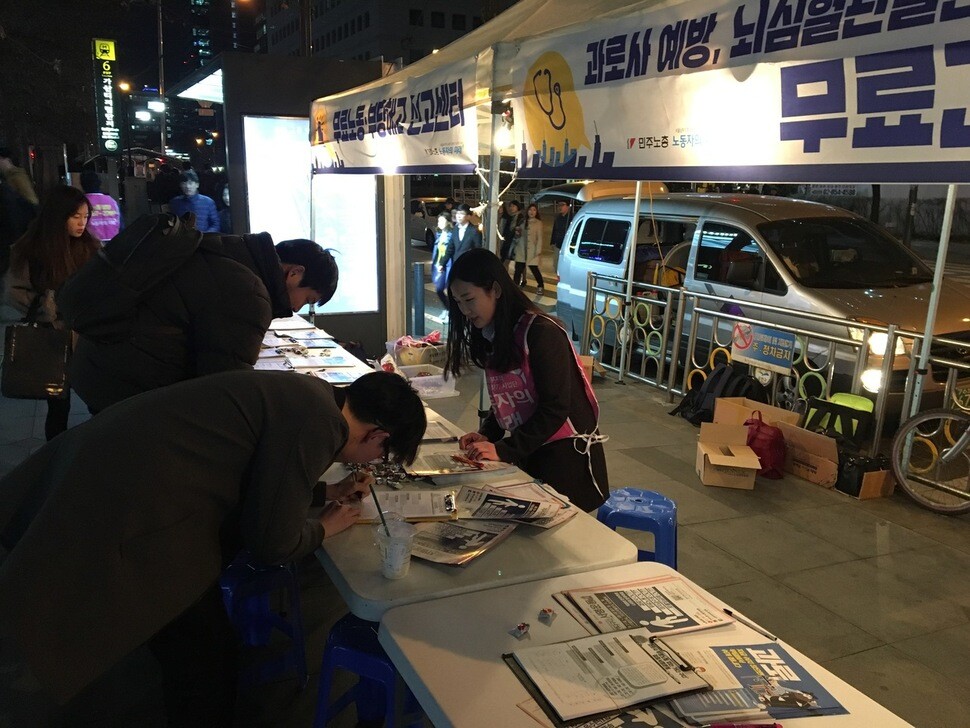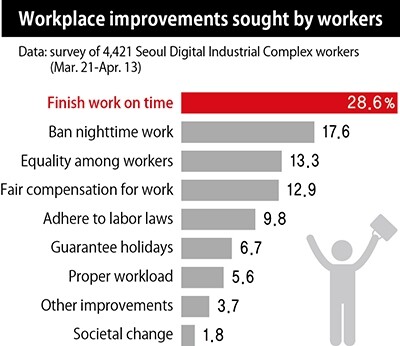hankyoreh
Links to other country sites 다른 나라 사이트 링크
Young workers decry “murderous work environment” at Seoul Digital Industrial Complex

“I’m going to call it a day a little early today.” It was 11 pm.
Kim Seong-su (33, not his real name) rose from his seat, aware of how this might look to his boss, who was still at the office. Kim, who has held an office job at a manufacturing firm at the Seoul Digital Industrial Complex for five years, arrived at the office that day at 8 am and worked for 15 hours. But there are still two hours before the end of the day: he usually works until 1 am.

When Kim is busy, he frequently has to work all night, and he doesn’t get a single day off all month, but he doesn’t receive any overtime pay. When he shows up to the office on holidays, he receives 25,000 won for “special work.” That’s the only way he can push his monthly salary above 2,000,000 won (US$1,750), if barely. Kim explained why young workers in their 20s and 30s put up with such long working hours: “You‘ve got to impress the company if you want to be promoted, and how can clerical staff show their loyalty? The only way is to go home late and to work on holidays.” But despite what he says, Kim changed his mind recently when he watched a colleague work himself to death. “It made me afraid. It was frightening to think that I could die, and I’m not sure how much longer I can hold out,” he said.
A petition organized by the Unpaid Work and Unfair Firing Complaint Center gathered signatures from 4,421 young workers in the Seoul Digital Industrial Complex on Apr. 30 who called for an end to unpaid labor and death from overwork. The Seoul Digital Industrial Complex consists of Gasan Digital Complex (on subway line 1) and Guro Digital Complex (on line 2).
200,000 people are employed at the Seoul Digital Industrial Complex, of whom 65% (130,000) are people in their 20s and 30s. With six sudden deaths and suicides occurring since last year at Net Marble, a mobile game company, and at LG Electronics Digital Center, there has been growing criticism of the “murderous work environment” at the Seoul Digital Industrial Complex. Having realized the severity of the situation, the southern Seoul council of the Korean Confederation of Trade Unions and local civic groups set up the Unpaid Work Complaint Center. For 10 days, starting on Mar. 21, the center collected the stories of workers at the complex whom staff from the center met on the streets at lunch and at the end of the workday.
The following are some of the messages that employees who are tired of staying late or even having to work all night wrote on the petition: “Please send us home,” “Let us go home for the day” and “Ban ‘passion pay,’” a reference to the poor working conditions often experienced by interns and other young workers. Others said that they “didn‘t want to have to worry about dying from overwork” and that they wanted “a decent work environment.” One person wrote about “having to work until after 9 pm to get a single 4,500 won (US$3.90) meal coupon,” another wanted “to be able to hold a job while raising children” and a third asked for “the power to be turned off [at the complex] after 6 pm.” “Company workers aren’t slaves,” “We’re not cogs in the management’s machine” and “Treat us like people,” others demanded.
“The fact that so many people want to be allowed to go home and want to be treated like people shows that Seoul‘s high-tech complexes are paradoxically places that drive young people into despair,” said Park Jun-do, secretary-general of the Unpaid Work Complaint Center. The center delivered the petition to the Seoul Gwanak District Office of the Ministry of Employment and Labor and asked the ministry to thoroughly investigate long working hours, unpaid allowances, back wages and the illegal use of temp agencies at the Seoul Digital Industrial Complex.
By Jung Eun-joo, staff reporter
Please direct questions or comments to [english@hani.co.kr]

Editorial・opinion
![[Column] Season 2 of special prosecutor probe may be coming to Korea soon [Column] Season 2 of special prosecutor probe may be coming to Korea soon](https://flexible.img.hani.co.kr/flexible/normal/500/300/imgdb/original/2024/0426/3317141030699447.jpg) [Column] Season 2 of special prosecutor probe may be coming to Korea soon
[Column] Season 2 of special prosecutor probe may be coming to Korea soon![[Column] Park Geun-hye déjà vu in Yoon Suk-yeol [Column] Park Geun-hye déjà vu in Yoon Suk-yeol](https://flexible.img.hani.co.kr/flexible/normal/500/300/imgdb/original/2024/0424/651713945113788.jpg) [Column] Park Geun-hye déjà vu in Yoon Suk-yeol
[Column] Park Geun-hye déjà vu in Yoon Suk-yeol- [Editorial] New weight of N. Korea’s nuclear threats makes dialogue all the more urgent
- [Guest essay] The real reason Korea’s new right wants to dub Rhee a founding father
- [Column] ‘Choson’: Is it time we start referring to N. Korea in its own terms?
- [Editorial] Japan’s rewriting of history with Korea has gone too far
- [Column] The president’s questionable capacity for dialogue
- [Column] Are chaebol firms just pizza pies for families to divvy up as they please?
- [Column] Has Korea, too, crossed the Rubicon on China?
- [Correspondent’s column] In Japan’s alliance with US, echoes of its past alliances with UK
Most viewed articles
- 1After election rout, Yoon’s left with 3 choices for dealing with the opposition
- 2Two factors that’ll decide if Korea’s economy keeps on its upward trend
- 3Noting shared ‘values,’ Korea hints at passport-free travel with Japan
- 4AI is catching up with humans at a ‘shocking’ rate
- 5Why Kim Jong-un is scrapping the term ‘Day of the Sun’ and toning down fanfare for predecessors
- 6South Korea officially an aged society just 17 years after becoming aging society
- 7Korea’s 1.3% growth in Q1 signals ‘textbook’ return to growth, says government
- 8Value of Korean won down 7.3% in 2024, a steeper plunge than during 2008 crisis
- 9‘We must say no’: Seoul defense chief on Korean, USFK involvement in hypothetical Taiwan crisis
- 10Is Japan about to snatch control of Line messenger from Korea’s Naver?